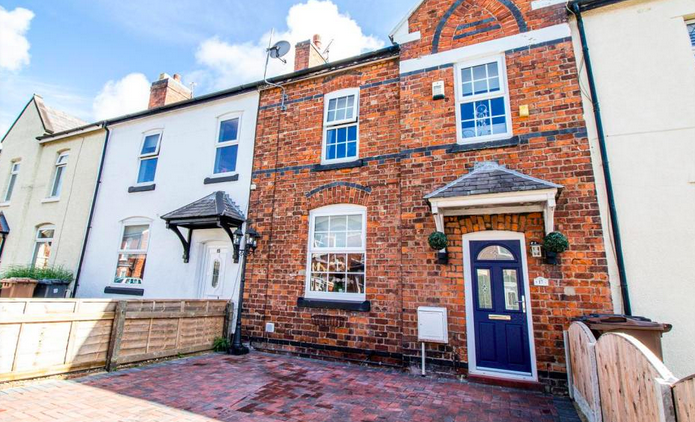‘Warm banks’ sound like a concept from a dystopian novel. But they’re now a reality

Liverpool Archdiocese and Museums Liverpool are trying to keep people warm this winter — plus the rest of your briefing
Dear readers — A big welcome to the 37 of you who signed up to a paying membership over the weekend, our best few days for growth since March! It means we’ve smashed through the 600 barrier and have made healthy progress on the journey to 700.
Today’s story concerns warmth; perhaps something some of us take as given, like electricity or water or Wifi. As winter draws closer and temperatures prepare to plummet, there is increasing concern across the country that high fuel bills will make it difficult for many to heat their homes. In response, an increasing number of “warm banks” have been popping up, run by local charities and faith organisations and designed to give people a few hours of heat each day.
At the weekend we took a deep-dive into the selection battle going on in West Derby, where Ian Byrne MP is under threat from his own party. Stories of Labour members shouting abuse at each other in meetings and food banks from different factions of the party refusing to co-operate were recounted to The Post. It’s a fascinating situation and inspired some really interesting comments from members. Take a look.
@streetskitchen @UKLabour @IanByrneMP In all seriousness, this is a good read to understand what’s going on.
— Marcus 🏳️🌈🌹🇬🇧🇺🇦 (@AtakinMarcus) 3:44 PM ∙ Oct 29, 2022
Last week paying members received two great pieces. On Tuesday Sophie served up a cultural double whammy; speaking to the people behind a trendy indie publisher — Dead Ink — who have opened a bookshop in Toxteth and then heading down to the docks for the very-big-deal of the Turner Prize, which is happening at the Tate. Here’s an excerpt from her piece:
“You can be cynical about the Turner Prize, as people are every year — you can argue it’s all razzle-dazzle, heavy on style, skimpy on substance. But no matter your taste, there’s a thoughtfulness to each of the works shortlisted this year which speaks for itself.”
Then on Thursday Jack addressed one of the city’s most debated and hated public spaces, the area around Lime Street. Because why does it look like…that? Join up to read those stories if you haven’t yet.
Editor’s appeal: We’re aware that times are hard — any kind of support at all is greatly appreciated — but if you can afford a paid membership (it’s £1.25 a week if you pay for a year upfront) we can keep doing in-depth and investigative pieces and expand our team in the new year. If you value The Post and want to help sustain high-quality journalism in Merseyside, please join today.
This week’s weather

This week’s weather forecast is sourced from the Met Office and it’s for Liverpool.
The Big Story: Warm banks setting up on Merseyside to see people through the winter
Top line: Around 40 Catholic social clubs “from the River Mersey to the River Ribble” will open up to keep people warm through the winter. The initiative is being driven by Jill Boggan at Liverpool Archdiocese in response to high fuel bills and the ongoing cost of living crisis, and is only one of several similar schemes across the county. A full list of facilities opening can be found here.
What is a warm bank? The concept of a warm bank — a space where people struggling to afford their heating bills can gather for a few hours each day to keep warm — seems fairly dystopian. But it’s a term you hear more and more frequently. The Liverpool Archdiocese banks will offer people across Merseyside free tea, coffee, biscuits and Wifi between 13:00 and 15:30. As Boggan told the BBC:
“We have liaised with other community groups to try and ensure that people have somewhere to go every day during the winter months.”
Context: Last month, councillor Jane Corbett told the Echo that Liverpool Council was at “emergency planning level” in response to the cost of living crisis and that if there was no financially viable way to keep some people warm in their own homes then warm banks would have to be explored.

The Green Party tabled a motion at council stating that, alongside the government, the “Mayor, Cabinet and Senior Management Team” had a responsibility to work with local organisations to develop “a series of warm banks / hubs in appropriate buildings, to enable those in need to seek sanctuary from the deteriorating situation as winter approaches.” It’s clear that the council is under pressure to provide these services, but it is in a tough place itself, facing cuts of £73 million next year, which will take the total amount lost from its budget above the half a billion mark since 2010.
National Museums Liverpool is also offering to take people in, although they have struggled to find a sustainable model to fund themselves due to increased bills and “often leaky historic buildings that don’t retain energy well,” according to Sharon Heal of the The Museums Association in the Guardian. The Association previously appealed for increased government funding in order for facilities to step up and meet their new role as havens of warmth for people struggling.
Can't believe I'm writing this, but I wonder if this winter well need 'warm banks' the equivalent of 'food banks' where people who can't afford heating are invited to spend their days at no cost with heating (eg libraries, public buildings)?
— Martin Lewis (@MartinSLewis) 4:00 PM ∙ Jul 11, 2022
Janette Williamson, Labour’s leader of Wirral Council, asked for a review of all council buildings — such as libraries and leisure centres — to see whether or not they could be used to keep people warm through the winter. Williamson, whose council is in severe financial trouble with a near £50 million deficit, said she had written to then-chancellor Kwasi Kwarteng but had received no response. She criticised a lack of government support to Birkenhead News:
“I called this extraordinary meeting to look at ways in which we can help our communities where our zombie Government is failing to act.”
Bottom line: National Energy Action figures show that 11,400 deaths are caused each winter by cold weather. There are fears that the figure will rise this winter. Many have understandable concerns that warm banks — not unlike food banks — will go from being a last resort against fuel poverty to a frequent fixture of many people’s lives.
Your Post briefing
Ian Byrne has urged his supporters to “be kind” on social media, after the announcement that Croxteth councillor Anthony Lavelle would be challenging him for his West Derby seat drew social media abuse. We revealed two weeks ago that Lavelle would be Byrne’s main competitor for the candidacy, and now the Echo have released a list of three more names who have made the longlist: Kimberley Whitehead of Hyndburn Council in Lancashire, Wirral Council’s Gillian Wood and David Bridson, a councillor in the London borough of Lambeth. Whitehead and Bridson are long-shots, because — despite the fanfare around celebrity candidates such as Eddie Izzard in Sheffield — Labour selections across the country have skewed very local so far: “of 36 selection battles fought, only two have picked outsiders,” ex-BBC journalist Michael Crick told The Post. Wood, on the other hand, stood in Croxteth Ward (the old West Derby Ward) in 1996 and her son was at a local school, so has a stronger connection. While insiders told The Post that this was a “two horse race” (and given the reaction to Lavelle’s candidacy, one that could get quite nasty) Wood is perhaps now the third, dark horse.
Walton MP Dan Carden is leading the fight to enshrine in law the rights of families to maintain contact with their loved ones in care settings. He opened a debate in the House of Commons on the matter with a personal story about his own dad’s death from lung cancer, describing “the anguish, the pain and distress of not knowing when you will next see your loved one”. His dad had been rushed into hospital one evening and ended up spending three days in an A&E side room, not being washed and without hot food. Due to poor phone signal, Carden was unable to contact him. He believes that families being unable to see loved ones — especially in care homes — is far too common. Health minister Helen Whately told MPs during the debate that she didn’t consider the “status quo acceptable” and was “on the case”.
Fetch the champagne, ready the confetti cannons, turn up the music, Liverpool has the greatest airport in the land! John Lennon Airport has been voted the country’s (joint, alongside Exeter) best by consumer group Which? with an approval rating of 83%. Customers praised the check-in and security, low waiting times, and the easy parking. Better still, our friends down the M62 will surely be spitting feathers: Manchester Airport was voted the country’s worst, with a shocking 38% approval rating. As one passenger told ITV of John Lennon: “It’s much smaller, less manic and so much more civilised than Manchester.” So there.
Home of the week

This lovely three bedroom brick terrace house in Southport is on the market for £180,000. It’s got french doors opening out onto a sun-catching patio, a large conservatory and a stand-alone bathtub. A word of warning: that wallpaper in the kitchen might need a rethink.
Open newsroom
Open newsroom: If you want to tell us about a story or give us some information, please email editor@livpost.co.uk. We are always happy to speak to people off the record in the first instance, and we will treat your information with confidence and sensitivity.
- This week we’d be especially interested to speak to anyone with knowledge of the development of the Ten Streets plans in North Liverpool. How are the plans coming along? Any snags? Get in touch.
- We’re also still keen to speak to staff at the new Royal Liverpool Hospital for any thoughts on the move and whether the city finally has the hospital it needs.
Post Picks
🗣️ Any paying members who enjoyed our Thursday read about the general weirdness of the area around Lime Street might enjoy this public opinion workshop, asking whether the demolitions on the street in 2017 were “vision or vandalism”. Where we once had the Futurist Cinema, we now have weird brown panels of men in donkey jackets. Go and give a piece of your mind (for free).
🥁 Beat away the stresses of life carnival-style with Katumba; a community-based afro-Brazilian drumming project fostering positive mental and physical wellbeing. It’s £10 and held at the Katumba Culture Hub on Upper Hill Street. You bring the rhythm, they supply the sticks.
🍲 Bric-a-brac stalls, handmade soaps, bright colours, international cuisine and healthy foods and drinks (“from kombucha to kimchi”) are on offer at Granby Street Market on Saturday. The market is from 10am-3pm on the first weekend of every month, and is a much-loved hub of the L8 community.
🏛️ St George’s Hall — one of Liverpool’s (and the world’s) finest neoclassical buildings, was once a meeting point of opulence and destitution; lauded by Queen Victoria but also home to the “depressing doldrums” of its prison cells. The History Whisperer at St George’s re-visits the building's story and guides you through its halls. Information here.
Our favourite reads
A rare interview in The Guardian speaks to David Taylor — not his real name — who spent years infiltrating gangs in Liverpool. Taylor remembers being stood with a group of criminals outside a pub who were planning to smuggle thousands of pounds worth of drugs into the country, when one of them described what he would do to an informer: “There’s only one way to deal with a rat — put it down there and then. You cut its throat and you put it down. You don’t have tears in your eyes when you’ve done it.”
The BBC took us on a boozy trip down memory lane with their look at the lost pubs of Scottie Road, after the Throstles Nest — opened in 1804 — closed down. The Nest was the last pub standing of the once-200 odd that occupied the street, a street that was “the beating heart of the city”. Scottie Road runs for about a mile through Vauxhall and according to the landlord at the Nest, who has run the pub for four decades, anyone who tried a pub crawl in the heyday would “always fail miserably [as] they couldn't get through them all”. It’s a sad read but an interesting one, about a part of the city that has had its heart ripped out.
We enjoyed this long-read in The Fence a few months back tracing the disturbing story of Emad al-Swealmeen, the man who built the bomb that detonated in a taxi outside Liverpool Women’s Hospital in 2021. Al-Swealmeen had claimed to have fled from Syria, but was later found to be Iraqi, but flung himself into life in England, a keen go-karter, cake-maker, budding parishioner at the local church and “perfect houseguest” to an elderly couple who took him in. The article explores the response to the near-tragedy and how underwhelming the writer found interviewing people that had come into contact with the attempted terrorist in the months after, noting that Liverpool “had already succeeded in relegating this unhappy moment to the status of footnote”.
Photo of the week

Team Ukraine’s Yuliia Kasianenko suspended in mid-air during her floor routine at the Women's Qualification on Day Two of the FIG Artistic Gymnastics World Championships at the M&S Bank Arena. The World Artistic Gymnastics Championships 2022 are going on all week in Liverpool.
Letters from readers
You’re correct about Liverpool College having two Ministers in the Truss Government but did you know Rishi Sunak’s dad was also an old boy there as i was — he was the year above me — I left in 70/71 and I was at a funeral of one of our old teachers and a student the year above me went to Liverpool University with Rishi’s dad to read Medicine. So Sunak very much has Liverpool roots! ‘Welcome to Liverpool! Welcome to Lime Street…’, Richard Davies
I have always understood that an MP is a representative of his constituents of whatever political hue and, no matter what his or her impact might be on national issues, failure to interact with constituents means that there is a lack of awareness of the overall feeling across the constituency. Conversations about school bullying, the drains, whatever, will cover more than the immediate issue — the mood of constituents across the political spectrum will come through from such exchanges and needs to be fed into an MP's party organisation at Westminster. To lose touch with constituents is to take them for granted and is essentially disrespectful to those who put MPs in office, ‘Ian Byrne fights for survival’, Ian Riley

Comments
Latest
How Liverpool invented Christmas
This email contains the perfect Christmas gift
Merseyside Police descend on Knowsley
Losing local radio — and my mum
‘Warm banks’ sound like a concept from a dystopian novel. But they’re now a reality
Liverpool Archdiocese and Museums Liverpool are trying to keep people warm this winter — plus the rest of your briefing